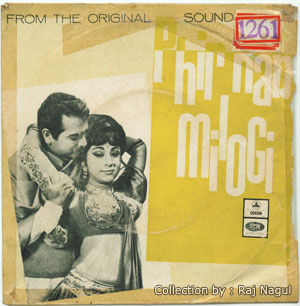Tum Mujh Se Roothe Ho

Film: Phir Kab Milogi (1974)
Producer: Hari Mehra
Director: Hrishikesh Mukherjee
Lyrics: Majrooh Sultanpuri
Singer: Lata Mangeshkar
I am not sure why but I always think that ‘may be’ Pancham has composed tunes for ‘Sharm Aati Hai Magar’ and ‘Tum Mujh se roothe ho’ at the same time. Though Phir Kab Milogi was released in 1974, it could have been a delayed production. I remember few years back my friend Kaustubh mentioning about H. Mukherjee’s 1967-68 shelved(?) movie ‘Bandagi’ which had RD Burman’s music. May be this was the same movie which got released with different name later on.
About this lesser heard song, this could be one of Pancham’s top rated songs due to its simple, soothing, melodious and structured composition. He must have asked Latajee to sing it with utmost relaxation…
‘Didi, sukooon ke saath se gaayiye’.
What a rendering! Each n every word is caressed with utmost sensivity and meaning. Arrangement definitely sounds from early era of Pancham, when he was composing other lesser heard gems like ‘Kajare Badarwa re’ from film Pati Patni.
Listen to the vocal and instrumental variations for words like ‘Chalo Maana’ and ‘Dekhon na’. Uff! Gives you goose bumps every time! When Lata repeats the lines Tum Mujhase roothe Ho at the end of first antara, she first ‘says’ Chalo maana, just like as a matter of fact and then in repeat line she ‘sings’ the words in tune to end the antara. Simply outstanding thinking by Pancham using both expressions n gayaki at the same time.
The same case is with ‘dekhon na’. Initial prelude music (M0) starts with a fast violin run which suddenly halts at little slow; saddish solo violin piece registering the tune for words ‘Dekhon na’. Also similar solo piece can be heard when Lata completes second antara at the end of the song. Lata gives different expressions to these words in Mukhada and Antara just like she did for ‘Chalo Maana’. If you also notice there is just 2 sec ’ Chello’ piece at the very beginning of second interlude (M2) which takes this song to another level. I would say if anyone wants to learn about ideal song orchestration then they should listen to this song. A real master piece!
Film version and Cassette/CD version of this song both have 2 antaras, However first antara from the film and CD is totally different along with its first music interlude (M1). When you hear both the versions, you cannot decide which one is better. In my personal opinion Cassette/CD music interlude should have been conceived by Basu Manohari however film’s M1 must be Pancham’s creative thinking. Listen to the 10 sec solo violin piece starting at 1.21min. Effective use of low notes matching with the expressions which heroine is going to sing in first antara. Film version of this song starts with solo violin piece which is nothing but tune of ‘Kya Hua Tera Vaada’ from Hum Kisise Kam Nahin. Sounds so fresh!
Unfortunately this song remains as Pancham’s lesser heard song however no doubt this was his one of his best creations. Penned beautifully by Majrooh, the song is appealing to every music lover and compels repetitive listening just like the words – ‘Mood ke dekho na’.
Sagar Kopardekar
panchammagic.org

